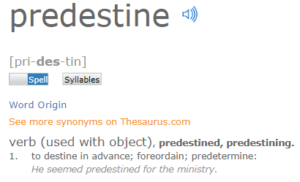Ephesians 1
Before I begin, I must say that understanding this passage without the lens of something like Calvinism is extremely difficult. A great debate rages on word definitions like “predestined” versus “foreordained.” Vitriol of the worst variety flows from the tongues and pens (and computer screens, let us not forget the keyboard warriors here) of everyone involved, and some sadly even in a misguided defense of the truth. Many hate this book because it lays down God’s eternal plan of the salvation of mankind under the New Covenant. However, I will not be “picking a side” in this debate, I will try to examine and exegete the text simply and plainly and let you do your own homework and make up your own mind on these things. There will doubtless be questions that arise, and I’m going to ask you to hold comments until the end when I will deliberately leave time to ask them. We will NOT be beginning a debate about certain doctrines or personalities here, just examining the Scriptures like the Bereans did in Acts 17:11. I don’t think the point of the original apostles was to fill our heads with doctrine, it was to give us a plan of action for our lives so we could undergo that sanctification process described throughout Scripture, but is best seen in Romans 12:2 by the transformational renewing of our minds, and in James 1 and 1 Peter 4, where the writers tell us that trials are the mechanism whereby we have opportunity to practice that new mindset.
1: a) Paul. Well, no doubt on the authorship <g>… b) apostle: The word simply means messenger, one sent on a mission. c) Christ Jesus. Did you know there is a debate on whether this should be “Jesus Christ” or “Christ Jesus”? I can already hear some of your thoughts – they go something like, “you’re kidding, right?” No, I’m not. This is a centuries-old debate at this point, and I’m not going to solve it here, but I think there is a difference, and when it occurs in Scripture it is an INTENTIONAL difference, and I believe that difference is one of emphasis. The term “Jesus Christ” emphasizes the human part of Jesus, who is the Christ. The term “Christ Jesus” addresses the divine aspects of God the Son, because “Christ” is actually a title, meaning “the anointed One of God” who has redeemed the world from sin through the death and resurrection of Jesus, the human form of God the Son. Do you catch the difference? The term here is emphasizing the divine first. Paul says he is a messenger of the Son of God who redeemed us. d) by the will of God. We read this statement a lot in the New Testament, and I think it is because it is important, because it goes to who God is – He is not some impersonal force, nor did He “set the plan in motion and then step back,” but instead He is intimately and closely involved in everything that happens. [context remark: We all like to complain, to the point of whining, and I do it also, about who is in charge of the country we live in. Some like them, some love them irrationally, some dislike them, some hate them irrationally. Did you know that it is God who put them there? Nothing happens down here that is not Father-approved. Gerry, quit complaining.] e) To the saints [Gk., hagios]. The Greek word is the most common reference to Christ’s followers in the New Testament, not some rarely achieved class of people that some guy in Rome has to “cannonize” for them to become saints. The meaning of “hagios” and all of its derivatives is simply “holy one.” You became a “holy one” when you became a Christian, because Christ Jesus, the God-man, died in your place to redeem you from sin. f) at Ephesus. There are at least 3 early manuscripts that do not contain this phrase, meaning this could be an “encyclical,” a letter specifically written to be passed around and read in all the churches; in a sense, this letter may have been in that way directly written to us! g) faithful in Christ Jesus. [Gk., pistos] the derivation of the Greek word means “full of faith.” In English we would turn it into a gerund and say “those who are believing.” And what are we believing? Christ Jesus, the God-man who died in our place to redeem us out of sin and into God Himself.
2: a) Grace and peace; typical greeting in Paul’s letters, communicating grace [Gk., charis, or kindness] and peace [Gk., eireenee, welfare, well-being] from b) God our Father [Gk., Theos patros heemown] and the c) Lord Jesus Christ [Gk., kurios Iesous Christos]. Think of the counter-culture implications of this verse, then and especially now. Ephesus was a center for education, trade, travel (civilian and military), and religion. The city was home to the great Temple of Artemis (or Diana), considered one of the 7 wonders of the ancient world. People were busy all the time, saddled with the usual ideas and ideals that one usually finds at a place where cultures cross like Ephesus. Today, multiply that by the internet. Many voices calling out to people claiming lordship in their lives. Was there ever a better time for the message, Kurios Christos?
3: a) Paul opens his address with worship of a sort, “Blessed be the God and Father of our Lord Jesus Christ…” “Blessed” actually means “well spoken,” a distant derivation of the Greek word “logos,” or as I have come to see it, the Divine Expression. The word is actually derived from a closer word: Eulogy, to speak well of, or to praise. So – blessed – God is the one that spoke it well, not me. b) “…who has blessed us…” Remember – it is God that said these things – c) “…with every spiritual blessing in the heavenlies in Christ…” Every means “all.” Spiritual is the Greek “pneumatikos,” of the Spirit. (The Greeks viewed spirituality as being related to air, Pneuma. We can see it today in English in words like “pneumatic wrench” for air-wrench, or the French for tire, “pneu.”) Blessing is the Greek “eulogia,” for bountiful, gift, praise, etc. in the Heavenlies. This is kind of a geographic reference. It puts these “every spiritual blessing” things in the realm of control of Heaven. In Christ – the anointed One who died to redeem us out of sin and into God.
4: a) He chose us in Him Who did the choosing? God did the choosing. b) Before the Foundation of the World. God chose us in a context! That context was before time began. God chose us in eternity. This is a place where when I try to consider this, my mind starts to stretch and bend. c) that we would be holy and blameless before Him. NB: I will consider this to be a complete sentence and the next two words “In love” to start verse 5. The chapter (1300s) and verse (1600s) divisions are NOT divinely inspired, just the text in its original form. Sometimes, people got it wrong after the completion of the original work. Holy – the Greek word hagios! Who? WE! Blameless – “amomos” or without blemish or fault. Who? WE! Where? “over against” (before) Him.
5: a) In love He predestined us – Love is agape. Predestined – Gr., “prohorizo” from “pro,” in front of, before and “horizo,” to mark off by boundaries; appointed, declared, determined, fixed, predetermined. A way we could say this in English would be “declared from over the horizon.” This would have been done at the time of the choosing (v.4). Another way of saying this is “foreordained.” I’ve read a lot of (insulting) debates over the differences between foreordination and predestination, and I’ve come to the conclusion that there are a lot of people that hold very dear opinions on both of these words. However, I’m not the one that says that the word can be translated both ways, that was Dr. James White, the guy who more or less helped translate the NASB. I’m taking his word for it. I have looked up both words in the dictionary and it says they are synonyms, that is words that mean the same thing.
 |
 |
So if predestination and foreordination mean the same thing, further debate is useless on the subject, they are just different ways of saying the same thing. Both mean this – that beforehand, God chose and predetermined that WE [Gk., muas, meaning “us”] were for something. But what is that? b) “…adoption as sons through Jesus Christ to Himself…” It was God’s plan to adopt mankind (or perhaps selected parts of it) as His own. The phrase “adoption as sons” in Greek is “huiothesia,” and is a compound word taken from “huios,” meaning mature offspring and “tithemai,” appointed. So, really God appointed us before all time as his mature offspring. Think about that for a minute! This was His eternal plan! c) …according to the kind intention of His will. Another way you can translate this entire phrase is “by His good pleasure.” Either way, it is what God sees as good and wants for Himself and us.
6: a) …to the praise of the glory of His grace… Just what it says. b) …which He freely bestowed on us in the Beloved. Who performed this action? God did. What was the action? He Bestowed. [Gk., charitoo, to make graceful, to endow with grace, from the root charis, kindness, given as an undeserved gift] How did He bestow or gift it to us? Freely. Without cost to us, though He Himself paid the ultimate cost to redeem us. He did this willingly. This, as we saw in verse 5, was His eternal plan.
7: In Him we have redemption through His blood, the forgiveness of our trespasses, according to the riches of His grace… This is our first clear look at what we identify as what in Galatians came in verse 4 of chapter 1 – that Lord Jesus Christ gave Himself to rescue (here, redeem) us from our sins (trespasses) according to the will of God (the riches of His grace). From the amazing statements before, we should begin to get a sense that God, from His throne outside of time, has always had a plan to do this Himself through the very one that was the creative force that spoke it all into being.
8: a) which He lavished on us. “Made abundant toward us.” b) I will treat this again as a part of the next verse.
9: a) In all wisdom and insight, He made known to us the mystery of His will… Wisdom [sophia, cleverness, applied knowledge] and insight [phronesis, understanding, know-how] – He made known [gnorizo, to make known] to who? To US. The mystery [musterion, secret doctrine] of His will. God has opened up to us with all the applied knowledge and theoretical know-how, His secret plan. b) …according to His kind intention which he purposed in Him… again, according to His good pleasure, which he purposed in Him [Christ]. Purposed [protithemai, to set before, to display publicly]. God showed openly His plan. What plan? The plan He has been describing to us so far. Why?
10: God has in mind that when He is ready (in the fullness of time), He will unite all things in Heaven and on Earth in Christ. How will He do this? Well, it doesn’t actually give the details, but I imagine it will be in His great power on display for all the universe to see. b) The last two words fit better as part of the next sentence in the next verse.
11: a) In Him also we have obtained an inheritance… Obtained [been assigned]. Inheritance [the object assigned]. How so? b) having been predestined according to His purpose who works all things after the counsel of His will… Well, it is because we were chosen and appointed before/outside of time according to the purpose/public display of the One who works for His Own Will to be done. Why?
12: Well, so that we who were the first to hope in Christ would be to the praise of His glory. a) “we who were the first to hope in Christ” is a reference to “we.” What is Paul saying here? Is he talking only about those who were apostles and the first few people to believe the message? No, I believe Paul is including everyone that is reading or hearing the letter. [Gk., heemas, “we”]. b) Why? So that God would be glorified, or Soli Deo Gloria – to the Glory of God alone. Why do I believe that?
13: “In Him, you also…” Paul is including us in “we,” and is saying more about it. And who is this all in? Christ! Solus Christos. In Christ Alone. a) “…after listening to the message of truth, the gospel of your salvation…” Paul is not saying this is somebody’s opinion or wingnut idea. He is calling the Gospel “the message of truth.” Not A message (no indefinite article in Greek, remember), THE message. Wow. The Gospel is the Definite Article. God allows us to hear by His grace, that is, undeserved, unearned favour. Sola Gratia. By Grace Alone. Okay, but something else is necessary. b) “…having also believed…” Remember that “believe” is the verb form of the noun “faith” in Greek. Sola Fide. By Faith Alone. That’s 4 out of 5 Solae. (5 out of 5 if you recall that we are reading this in the Scriptures that Paul wrote, so Sola Scriptura. In the Scriptures Alone.) c) “…you were sealed in Him with the Holy Spirit of promise…” Sealed. Like a letter was sealed, some melted wax was placed on the opening of the letter, and a signet ring was pressed into that wax to seal it, and to identify the one who did the sealing. What seals us? The Holy Spirit. Promise [summons, or if you like a guarantee or warranty].
14: Who is this Holy Spirit (never mind the third person of the Godhead stuff, we all know that, I mean here)? Well it says here that He is our “down payment” on our inheritance. And you thought this was as good as it gets? Oh saints, there is SO much more…and we really have no idea. The Holy Spirit is our down payment guarantee that God will at some point come and finally save us (redeem us wholly) and we will be His forever, all to His glory and praise. Okay, I see your confused looks. I’m speaking not about justification, or even sanctification here, but of glorification, the final step in our redemption where sin is finally removed from us once for all. Am I forcing the text? I don’t think so. See the pattern laid down here. The chapter starts by talking about what is past, our justification, and some of the when, how, why, etc. Then it talks about our sanctification or rather the results of it, our inheritance, so what is left? Our glorification.
15: Here is where Paul begins his incredible prayer for us. There is a worthwhile pursuit here. Examine all of the prayers of Paul in this letter for us. They are amazing and so encouraging. In fact, Paul tells us that he was inspired by the great report that had come to him about how the church at Ephesus was growing in the grace of Christ, and more, was seen to be growing in love for God’s people, as per what Jesus once said about how people would know that we were His true followers – that we would love one another.
16: This causes Paul to give thanks for the Ephesian believers, and to pray for them in the following fashion:
17: a) “…that the God of our Lord Jesus Christ, the Father of Glory…” How about that? God has a God. Himself. Because it is established earlier in the chapter and elsewhere in Scripture that Jesus Christ is God the Son, this may be seen as linking the two together in divine nature (but to take it from this reference only is a mistake). This God of our Lord Jesus Christ is “the Father of Glory” or “pater tees doxes” (Greek) is the father of all that is worthy of praise, glory, good report, etc. b) “…may give to you a spirit of wisdom and of revelation in the knowledge of Him.” Wisdom [sophia, applied knowledge]. Revelation [apokalupsis, an uncovering, a revealing]. Knowledge [epignosis, true knowledge, recognition]. Of who? Of Him, Christ Jesus.
18: “…eyes of your heart…” This is not saying that your heart has eyes. This is figurative language. Paul was not writing a science text. We could say this in English: The thing you gaze upon from the center of your being. However you say it, the apostle is praying that it would be enlightened [photizo, illuminated] for a three-fold reason. a) 1. “…so that you will know what is the hope of His calling…” Hope [elpis, expectation] of His calling [klesis, calling, invitation, summoning]. b) 2. “…what are the riches of the glory of His inheritance in the saints…” Riches [ploutos, flowing wealth, flowing abundance, more and more coming, not always monetary]. Glory [doxa, everything worthy of praise or good report]. His inheritance [kleronomia, what you are appointed to receive] in the saints! What? What does that mean? Heb. 11:39-40. We will all be “made perfect” or completed TOGETHER! A word on the subject here: yes, you must attend a body of likeminded believers. Why? Well, without the rest of us, you will not be “made perfect” or completed. It’s just that easy. There are a lot of reasons. Some of them include accountability, encouragement, examples (both good and bad), all that and more.
19: a) 3. “…and what is the surpassing greatness of His power toward us who believe.” This is literally saying surpassing greatness of His power [dunamis, miraculous strength, power, might, etc.]. And it is all directed toward US who believe. Those of the household of Faith. b) This is in agreement, alignment, accordance with His strength [kratos, strength in the sense of dominion] of His might [ischus, strength in the sense of the physical realm].
20: a) “…which He brought about in Christ…” Remember that Paul is a Jew and is learned in Scripture. I think Paul is trying to make a connection here. Nothing that has ever been done has been done apart from the grand plan of redemption that is described in the opening verses of this chapter. This is “in Christ,” and more, it describes the work that Christ has Himself already completed on the Cross by association in b) the rest of the verse. He names those works specifically that apply here. 1. He raised Christ from the dead. Okay, that’s pretty big. Know anyone that’s come back from the dead personally? Yeah, me neither. 2. Seated Him [Christ] at His [the Father’s] right hand in the heavenlies. Okay, that’s something over and above the resurrection, and we will see in coming chapters that this has direct implications for what God intends for us.
21: “…far above all rule and authority and power and dominion, and every name that is named, not only in this age but also in the one to come.” Wow, that’s a mouthful. Rule [archos, origins, domain – the rules of creation], Authority [exousia, the power to act]. Power [dunamis, miraculous strength – supernatural in origin, if that wasn’t already obvious]. Dominion [kuriotes, lordship]. Jesus is FAR above ALL that. Every name that is named. The sense here is that of reputation. And not only in this time period, but the one that is coming. What does THAT mean? Well, I did say there was more than we understood here, right? I think I have an inkling, but it’s only speculation. However, Jesus son of Joseph of the line of David will sit on the throne of David and rule everyone and everything. I think it involves that, and I’m getting that from the next verse.
22: a) “…all things in subjection under His feet…” This is a direct reference to Psalm 110:1, which says “The Lord says to my Lord: ‘Sit at My right hand until I make Your enemies a footstool for Your feet.'” Jesus quotes this directly, speaking of Himself, in Luke 20:41-44. At some point, we will all bow the knee and say that Jesus is Lord. Better to choose to do it now than be forced to do it later I think. b) “…and gave Him as head over all things to the church…” Here you are, Christ is head of the church in all things. I didn’t say it Paul did, and he was just saying the truth. So that doesn’t mean we can just introduce our own ideas willy-nilly, we have to know what HE said.
23: a) “…which is His body…” Again, there you have it. The church is the body of Christ. I wasn’t making that up, and neither was Paul. So He is the head, and we are the body. More is coming on this, so I will just mention it here. b) “…the fullness of Him who fills all in all.” Fullness [pleroma, all that it contains or can contain]. Fills up everything with everything (all in all).
Okay, that was a lot of intense stuff. Take a breath, and let’s have your questions. I’m guessing there are a few. I will not answer questions having to do with doctrines named after people unless it applies to the text.







